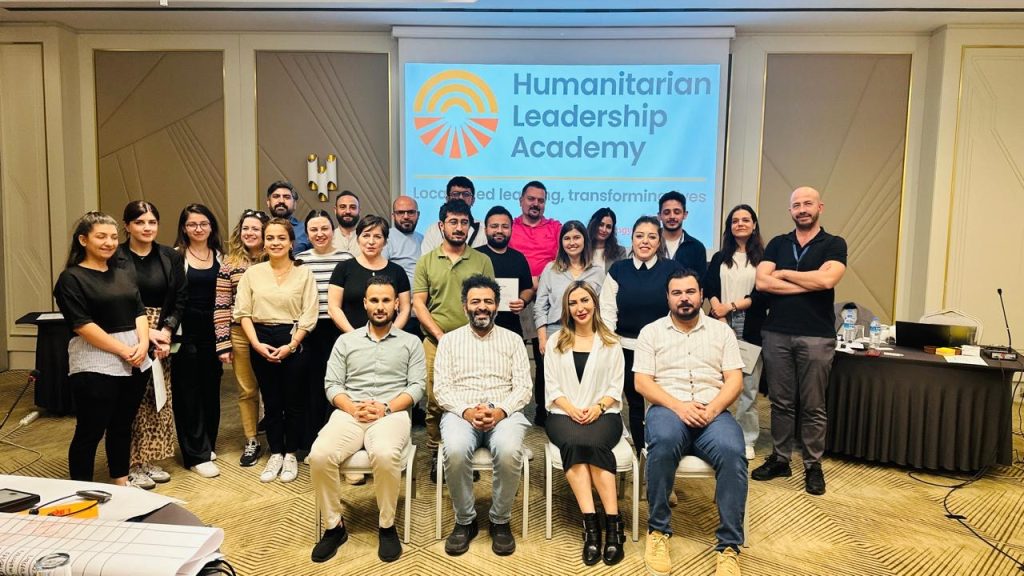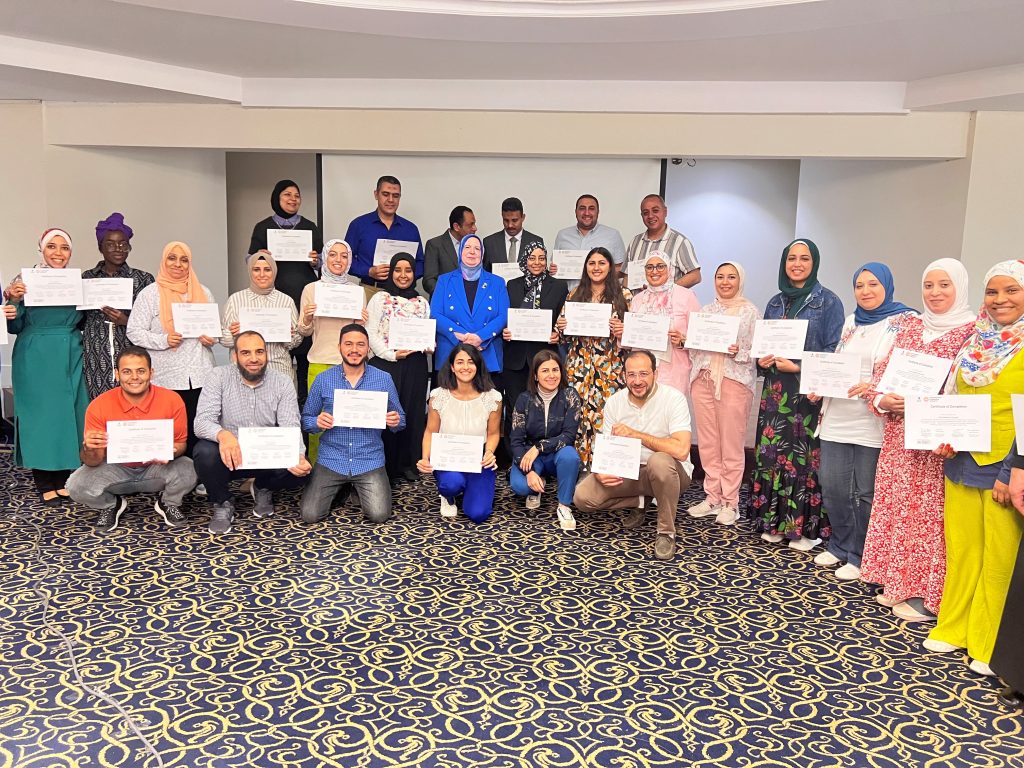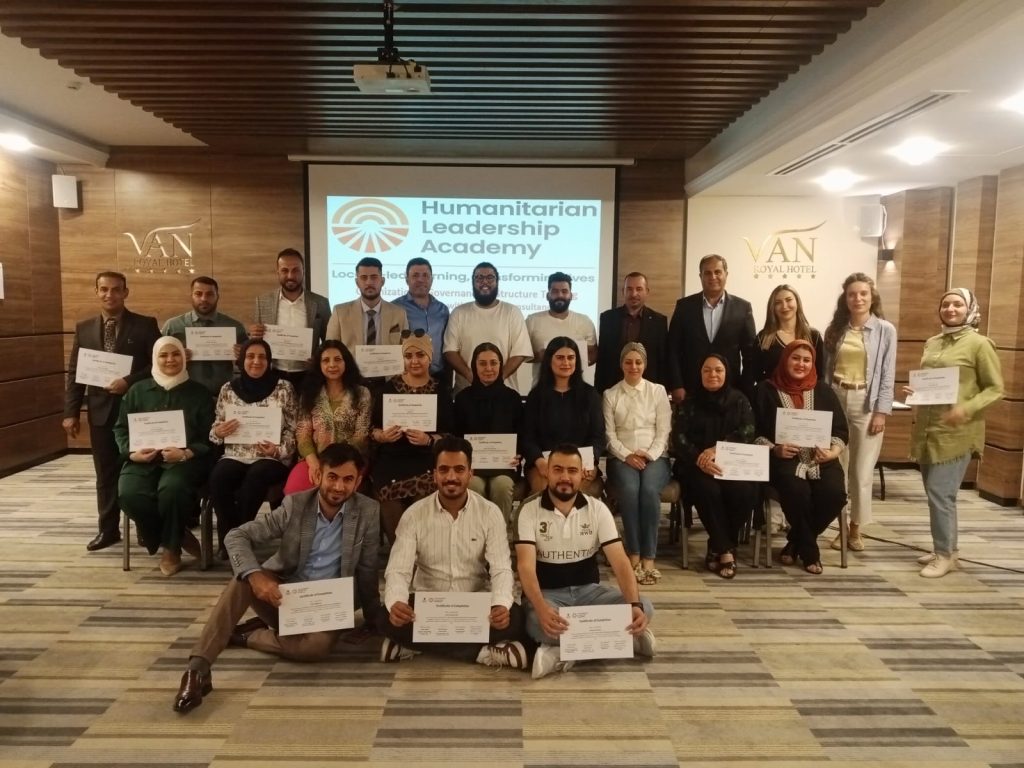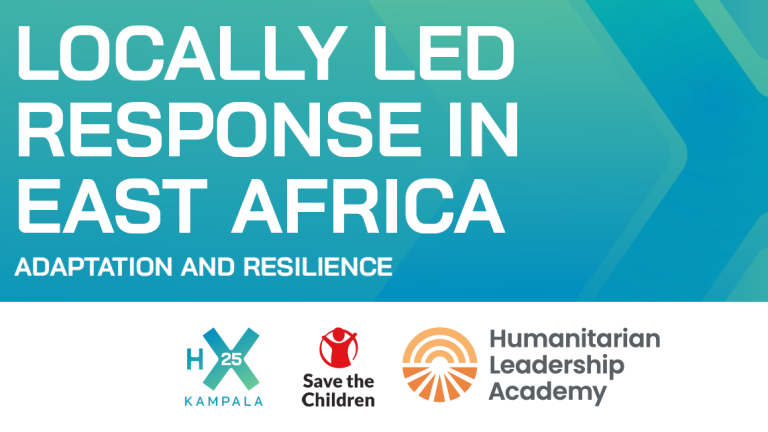13th June 2024
Following the HLA’s holistic approach in supporting local communities in responding to crises, our Middle East & North Africa regional team provides various trainings in the region. During the last two months, our colleagues delivered trainings covering topics such as crisis management, child protection in humanitarian action, education in emergencies, project management, managerial wellbeing and resilience and more to local humanitarians. We had a catch-up with the team to hear about the trainings, a new capacity-strengthening programme that the HLA is rolling out in the region right now, and the plans ahead.
Q&A with:
- Bdour Ghousheh, HLA Regional Lead in Middle East & North Africa
- Rafka Daoud, Education in Emergencies Professional Development Programme Regional Manager
- Fatima Zureigat, Regional Capacity Building Programme Manager
- Salma Babban, Global HLA Translation Manager
O: Bdour, I would like to start by asking you to tell us a little about your team and how you stay effective and coordinated while working on multiple programmes in different countries.
Bdour: Thanks, Oksana. I manage a diverse team of five colleagues based in Jordan, Türkiye, and Lebanon. We ensure everyone is informed about our partners’ and country offices’ emerging needs and priorities. We then coordinate responsibilities to maintain a complementary and efficient workflow. Our flexibility enables us to effectively tackle urgent and unplanned challenges.
O: It is difficult to overestimate the importance of staff wellbeing for a healthy and productive work environment. Tell us about the remote session on Staff Wellbeing.
Bdour: Staff wellbeing is crucial, especially during times of hardship. For instance, the February 2023 earthquake added significant stress on local Turkish organisations as they responded to the crisis. Our role at the HLA is to provide guidance on the importance of staff wellbeing, an aspect often overlooked in such situations. We facilitated a remote session for the organisations actively involved in crisis response, incorporating practical, hands-on activities that senior management can implement for staff wellbeing. This session aimed to ensure that staff wellbeing is prioritised and integrated into the organisational response to crises.
O: Fatima, at the beginning of May, you organised and co-facilitated the Project Management training in Ankara in collaboration with Save the Children International. Twenty people from Turkish Local Government and local NGOs took part in this training and received project management planning and implementation methodology and tools. Can you share the plans to follow up on how this training increased local NGOs’ access to funding to sustain their support to the local community?
Fatima: HLA MENA team is providing capacity-strengthening support to partners in Türkiye in different areas. We started with a learning needs assessment (LNA) which was conducted in collaboration with Save the Children International Türkiye Country Office and resulted in 6 main prioritised areas. The LNA was followed up by several meetings with the Partnership Team to identify and agree on the most needed trainings and the areas which will need to be followed by an action plan.
Project management was identified as one of the essential areas. After the training was delivered in May, the Action plan for partners is to utilise the provided project management resources and tools within their organisations. Through the Save the Children Türkiye Country Office Partnership Team, we will follow up on the progress in a six-month evaluation starting from June 2024.
Completing this course also enabled the participants to sign up for the Project D Pro certification.
Our team is planning to provide trainings on fundraising, proposal writing, and grants management to the Save the Children International Türkiye Country Office local partners to increase their access to funding opportunities.

O: Rafka, in coordination with Save the Children International Egypt Country Office, you have delivered Education in Emergencies (EiE) Fundamentals training in Cairo. 26 employees of local NGOs and local staff of international organisations operating in the country took part in this training. As you have vast experience in delivering EiE training, can you share how this one was adapted for the participants’ needs and what made it different/special?
Rafka: The Education in Emergencies (EiE) training is designed to address the unique challenges of providing education during crises. While there is a programme to follow, trainers adapt practical activities within each module to the context, tailoring the training to the country-specific emergency setting. To be able to adjust the training activities, reflection was made to understand the Sudan refugees situation, and the different EiE programmes implemented in this country. Worth mentioning that the facilitators who supported the delivery of this training are local EiE Certificate of Advanced Studies (CAS) Graduates.
O: There was also an additional Education in Emergencies Technical and Operational Preparedness for Rapid Response training in Egypt. Tell us about this extra one-day training.
Rafka: Preparedness Day was first implemented in our region. It was an extra day following the EiE Fundamentals to help the participants put this learning into practice. It also created a space to reflect on their own practices in planning for emergency settings and find areas of improvement.
This training focused on strengthening preparedness for EiE in the context of Egypt specifically. Preparedness is essential to respond more efficiently and effectively in times of crisis, to ensure children’s learning continuity, to enable their protection, wellbeing, and safety, and to support access to other lifesaving services through learning spaces, such as provision of food, clean water, and health information.

O: You also recently delivered two trainings in Iraq. One of them, Governance & Structure course, was just piloted. Fatima, could you tell us about this new programme?
Fatima: The Governance & Structure course was designed by our team in collaboration with Humane Consultancy Firm. This 4-day course aims to provide valuable insights, useful tools, and practical strategies to optimise organisational governance and structure. 20 representatives of local organisations attended the training to learn how to make processes clearer, more efficient, and sustainable, and become a confident leader ready to make a difference. Participants shared very positive feedback and highlighted the usefulness of the decision-making tool. According to the action plan agreed with Save the Children International Iraq Country Office, they will further cascade this learning within their organisations.

O: Salma, I would like to ask you about the Crisis Management trainings. One was earlier delivered in Amman, Jordan, to 22 local staff of Save the Children International and the HLA. Can you tell us about Introduction to Crisis Management Training which was delivered together with Save the Children International Iraq Country Office to 20 participants from local NGOs and government.
Salma: This 2-day training enhances organisational readiness and capacity to respond efficiently and effectively to humanitarian emergencies while prioritising the safety and wellbeing of both responders and affected communities. The training aims to equip participants with the knowledge, skills, and tools necessary to mitigate risks, coordinate response efforts, and assistance to affected populations during times of crisis. The training in Amman was followed up by Training of Trainers (ToT). In both these cases, we delivered the training in Arabic. Participants shared very positive feedback and highlighted the usefulness of the Crisis Preparedness Plan tool, which helps them develop and implement Crisis preparedness plans for their institutions and organisations.
O: In April, the HLA, in partnership with Save the Children Türkiye, UNICEF Türkiye, the Alliance for Child Protection in Humanitarian Action (ACPHA) and the Child Protection Areas of Responsibility (AoRs) for Türkiye and North West Syria, jointly delivered the CPHA Training of Trainers (ToT) for 34 child protection practitioners, mainly from local and national organisations working in earthquake-affected areas of Türkiye and North-West Syria. (More about it here: Child Protection in Humanitarian Action Training of Trainers in Gaziantep) Bdour, tell us more about cooperating and collaborating with various actors in the region to better address learning needs.
Bdour: It is always very important to consult with all stakeholders before designing any initiative. We do this as a first step by communicating with all local actors: clusters, working groups, NGO forums, and our country offices and partners. We get a more in-depth idea of the needs by conducting consultations, focus group discussions, and surveys. We usually deliver joint activities with the key stakeholders such as UNICEF, the Alliance, and relevant local clusters.
O: This leads me to the next exciting topic. As Surge Capacity Strengthening Programme started in Türkiye and Syria, you have now shortlisted candidates for the Core Coaching Skills Programme which offers online sessions for local humanitarians who aspire to coach their colleagues. Can you tell us a bit more about this part of the programme and maybe a little bit about the participants?
Bdour: Coaching Skills Programme was tailored for local humanitarian leaders in Türkiye and Syria. This initiative is designed for passionate humanitarian leaders eager to enhance their leadership skills, cultivate self-awareness, and foster an environment conducive to critical thinking and support. We have shortlisted 12 local leaders from both Türkiye and Syria contexts. The online training sessions provide practical and hands-on tools for effective mentoring and coaching practices that can be utilised on the local organisation level.
O: The programme also includes Sustaining Resilience at Work and Trauma Management trainings which are planned for the end of summer and autumn. According to the plan, we expect about a hundred people to take part in these sessions. Can you explain the difference between these two training programmes and give some details about what the participants will learn?
Bdour: Due to the difficult situation our region has been facing we realised the importance of holding these trainings for Türkiye and Syria contexts. These sets of trainings will cover different topics such as wellbeing and resilience in the workplace, how to conduct wellbeing conversations, using active listening, workplace stress management, as well as referrals and accessing treatments. It is crucial for people working in humanitarian sector to be able to spot and unpack signs of distress and trauma that may go unnoticed.
O: Your team is also working on another new offer for humanitarian actors in Türkiye and Syria. Do you want to make an announcement?
Bdour: Yes, we are excited to announce the upcoming Convening space for local Syrian and Turkish organisations In October 2024! The HLA MENA Regional Center will be hosting a convening event, with a focus on the Turkish and Syrian responses. This event, spanning two and a half days, will serve as a dynamic platform for collaboration and knowledge exchange. Led by local actors and supported and facilitated by the HLA, as well as the Turkish and Syrian Save the Children International country offices, these events are designed to cultivate networking and connections among local actors, international organisations, donors, clusters, and working groups.
Throughout this event, local actors will have the opportunity to showcase their successes, share best practices and insights while also addressing the challenges the humanitarian sector in Turkey and Syria faces. Attendees can anticipate a wide range of capacity-sharing activities, including mini-workshops, panel discussions, and presentations.
This event will be held in-person in Gaziantep, Türkiye, with translations provided in Arabic and Turkish. Additionally, to ensure inclusivity and accessibility, online sessions will be available for participants facing accessibility challenges in other locations such as Northeast Syria and government-controlled areas.
So, stay tuned!



